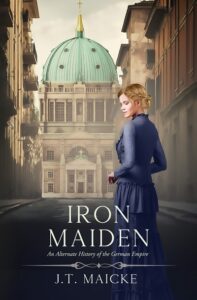Iron Maiden: An Alternate History of the German Empireby J.T. Maicke
Description Iron Maiden by J.T. Maicke
What if a woman ruled Germany in 1914? This alternate history explores that very question. An elaborate attempt to rid Germany of the Hohenzollerns has left a young sole heiress, Christiana, to take the throne of the German Empire. But this is no typical princess, hidden away in a gilded cage. This college educated, expert fencer, and accomplished equestrienne is not the meek little girl the politicians think they will be able to control. She has her own ideas how to rule!Praise for J.T. Maicke’s First Novel The Humble Courier
“A great story of an unlikely hero during an awful time. J.T. Maicke has crafted a compelling story of an unlikely hero during a most troubling time, the rise of Nazi Germany. This is a compelling book to read, whether you are a fan of historic fiction or simply seeking a terrific narrative and story. Maicke has created compelling and realistic characters that one can identify with, and truly care about. It is a story that will last with you long after the book is completed, and leaves one longing for new works from this author.”-John, Amazon Review “This was an engaging read. The years between the ending of WWI and the start of WWII set the stage for events that would completely change the world. Normally when we think of the world wars, we think of Germany occupying other countries, and not other countries occupying Germany. This book takes the reader to a point in time often overlooked, and lets us step into the story through the eyes of a Catholic priest who wishes for justice, and the freedom to practice his religion and minister to his parishioners. I loved Father Harti as a character, and thought Maicke did a wonderful job bringing him to life. It was easy to get lost in the story. A great book for historical fiction lovers.”- Liliyana Shadowlyn, The Faerie Review “I have greatly enjoyed this book. I am impressed with the historical accuracy which makes the story even more compelling. The reader is draw into the story as if they were right there.”- J. Larkin, Amazon Review “A humble village, loving community caring Catholic priest. Sounds perfect, but then it centers in Germany in the 1930's. The idyllic life of the priest and others is turned around affecting not only the grownups but children as well. I especially liked the references at the back of the book to places and people. At the end of the story, I had tears in my eyes.”- Christine Mueller, Goodreads Review “An intriguing story set in Germany mainly during the early WWII era leading to thought provoking events! Harti is a Catholic priest of the small village where he was born. Sounds like a boring life? Oh, no, not for Harti! He is consumed by a deep sense of justice... That's only the beginning of Harti's trail of thoughts.... What I particularly enjoyed in this novel, lies in the writing style. All along the plot, the author gives a summarized account of the political situation in Germany along with the reactions of the Allies from the end of WWI on (French occupation after the Versailles Contract had been signed). I learned details I was not aware of, particularly about the role of the Catholic church at this time. Harti referred many times to the Bible (though not overwhelmingly) in order to find a way to find justice. That was for me very interesting and definitely thought provoking! The characters are fictional, some events and real people made fitting the story, but all made sense. A compelling novel!”-Christine, Amazon ReviewExcerpt
In the Cabinet conference room next to his Wilhelmstrasse office, Chancellor von Eichenburg was about to proceed with the next item of business when he was interrupted by the sounds of cheers from outside on the street below. He gave his colleagues a puzzled glance, rose from his chair at the head of the table, and walked to one of the windows. He was soon joined by several other Cabinet members. To their surprise, a sizeable crowd was lining both sides of the Wilhelmstrasse, looking expectantly north toward Unter Den Linden, the main east-west boulevard running through the heart of Berlin.
“What is happening?” asked Wermuth, the treasury minister.
“Is it a riot?” added General von Lyncker with a gasp.
“Delbrück, see if you can find out what is going on,” von Eichenburg ordered the Interior Minister.
Von Delbrück dispatched his secretary but, as soon as the young man opened the double doors to the conference room, he was met by a Guards major, accompanied by two infantrymen armed with rifles.
“What is the meaning of this?!” demanded the Chancellor. “What is happening in the street?”
“You and the rest of the Cabinet and your aides are to remain in the conference room, Herr Reichs Chancellor,” answered the major in a stern voice. “By order of her Imperial Majesty, the Empress Christiana.”
“What!?” roared von Eichenburg. “What nonsense is this? You!” he ordered, pointing at von Delbrück’s secretary. “Go and find out what this is all about!”
The secretary, a slim man in his twenties, turned toward the major and quailed under the officer’s hawk-like glare. The young man turned back toward the Chancellor, his hands spread, palms up, with a plaintive look on his face before stepping back away from the doors.
“I repeat, Herr Reichs Chancellor,” stated the major flatly. “You and the rest of the Cabinet are ordered to remain in this room. The Empress will arrive shortly.”
“The Empress! Here?” gasped von Schön. The Chancellor and his colleagues looked at one another in amazement and ran back to the windows, ignoring the Guards officer and his soldiers who remained at the double doors.
The Cabinet members quickly opened the windows and leaned out looking toward the north just as the crowd on the street below erupted into cheers. Her Imperial Majesty, Kaiserin Christiana, escorted by over two hundred Guards cavalry and infantry, was riding down the Wilhelmstrasse in what appeared to be an impromptu parade. The Empress was accompanied by Generals von Heeringen, mounted one horse’s length behind her to the right, and von Löwenfeld, riding at a similar position to her left. Christiana waved to the cheering people on both sides of the street. Suddenly, she turned toward von Löwenfeld who then shouted an order for the parade to come to a halt.
Christa dismounted and walked to the left side of the street. General von Löwenfeld called for a squad of infantrymen to accompany the Empress, but she waved them back into formation. Instead, von Löwenfeld quickly dismounted and strode purposefully behind his queen.
Christa approached a little brown-haired girl, about ten years old, and a small boy, apparently her younger brother, standing by the curb. Both children were thin, dirty, and dressed in clothing that amounted to little more than rags. The little girl was clutching a small bouquet of drab, wilted flowers that might at one time have been pansies. The crowd drew back, jostling one another, the men frantically bowing and women curtsying as Christa approached. The children, wide-eyed, were at first too astonished to move, but then the girl nudged her brother who attempted a clumsy bow while his sister curtsied and held out her bouquet. Christa nodded to the urchins and accepted the girl’s dead flowers before taking a knee before them.
“What are your names, my dears?” she asked.
“I am Greta, Your Majesty,” answered the girl with a whisper Christa could barely hear. “Greta Vogel. And this is my brother, Uli. I mean Ulrich, Your Imperial Majesty.”
“Where are your parents, children?”
“We have no parents, Madam. Papa died at the factory and Mama got sick.”
“Who takes care of you?”
“We take care of each other,” the girl answered, looking down at her brother. Uli looked up at his older sister, smiled, and nodded.
Christa, looked over her shoulder at von Löwenfeld and quietly gave an order. The old general smiled, clicked his boot heels together while giving a short, crisp bow of acknowledgement, and called over two cavalrymen who walked their horses toward the Empress and the children. Christa again turned toward the youngsters.
“Would you like to join my parade?” she asked. The two children gasped and stared at one another in amazement before nodding enthusiastically.
“Wonderful! These two men are going to give you a ride on their big horses. Then we will get something good to eat, alright?” Again, the children nodded fervently before the little boy suddenly reached out to Christa and hugged her tightly around her neck. The startled Empress laughed, hugged the boy back, and then reached out to Greta who joined in the embrace. The astonished crowd erupted into cheers and applause. General von Löwenfeld helped the children up onto the front of his Guardsmen’s saddles as Christa remounted and the parade continued.
“Well, can you imagine the old Kaiser or his grandson doing something like that?” asked a tradesman wonderingly, referring to Wilhelm I and Wilhelm II.
“I can’t even imagine the Emperor Friedrich doing something like that!” answered a man standing near him. The men and women within earshot nodded in agreement.
And with that one simple gesture of kindness, Christa had won the love and admiration of the masses. Journalists in the crowd ran off to file their stories, which within hours spread throughout Germany and all over the globe, describing Christa as Germany’s new, beloved “People’s Queen.”



Thanks so much for hosting. I am so glad you enjoyed 'Iron Maiden' so much!
ReplyDelete